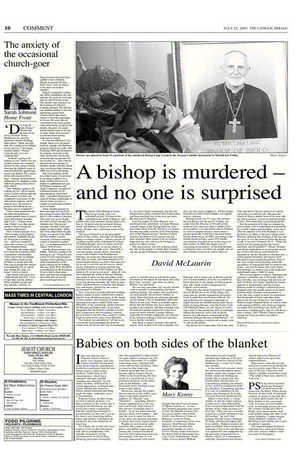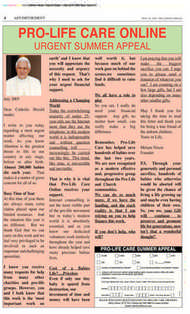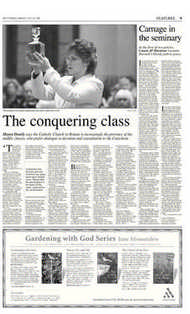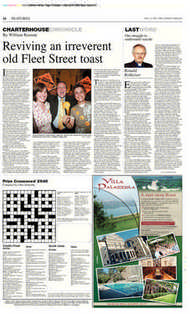Page 10, 22nd July 2005
Page 10

Report an error
Noticed an error on this page?If you've noticed an error in this article please click here to report it.
Tags
Share
Related articles
Italian Bishop Murdered In Kenya
African Diary
Kenyan Prison Chaplain Strangled
Bishop Urges Investigation
Vatican Names Missionary Martyrs Of 2005
A bishop is murdered – and no one is surprised
David McLaurin
The death of the Bishop of Isiolo, Mgr Luigi Locati, who was murdered on July 14 close to his cathedral in the north of Kenya, will produce the usual reaction among those who hear it. To those who do not know Kenya, shock and dismay; to those of us who do, shock, dismay, and a sickening sense of the familiar.
The town of Isiolo is in the geographic centre of the country, but maps are deceptive. Kenya is a large country – about a quarter of a million square miles, inhabited by at least 30 million people, most of whom are to be found around Nairobi, or on the shores of Lake Victoria, or on the coast. The north is vast and empty, largely desert, stretching away to the borders with Somalia and Ethiopia. Its roads are often trackways passable only by truck, and made dangerous by armed bandits known as shifta; here one travels at one’s own risk and in convoy, which means in practice a rusting machine gun attached to the roof of the leading car. But better to fly or not travel at all – after all, why drive through the north of Kenya? Perhaps one might want to see the marvellous Lake Turkana, but no one in their right mind wants to go near lawless Somalia. By African standards, northern Kenya is remote and dangerous, and largely ignored by the central government in Nairobi.
New woes have recently afflicted northern Kenya, thanks to poor rainfall and competition for ever-shrinking pastures, in the shape of clan warfare. Just recently, 82 people were massacred at a place called Turbi, near Marsabit, in the continuing clashes between the Borana and Gabra clans. It has been suggested that the bishop’s murder is somehow connected to this escalating violence, but it is hard to see how this can be so, when Isiolo is many hours away from Marsabit.
The bishop was attacked at 7.45 pm as he crossed the yard separating the pastoral centre from his house. He was accompanied
by an askari (night watchman), but this did not prevent a gang of raiders first beating him and then shooting him in the face and neck. He died later in hospital.
Last November, Fr John Hannon was murdered in his presbytery at Upper Matasia, a small village in the Ngong Diocese, fourteen miles from Nairobi. Nor have we forgotten here the earlier murder of Fr John Kaiser, also of the Ngong diocese. Neither of these murders has been solved, and no one has been arrested; there seems to be no realistic hope that any one will ever be brought to justice for these crimes.
The missionaries who die in Kenya share the fate of the people to whom they minister: ask any group of Kenyans what their prime worry is, and the answer will not be unemployment or the threat of starvation, but what they term “security” and what we call in Britain “law and order”.
We can only speculate why anyone should want to murder a conscientious and hardworking bishop. The raiders (the usual term for such people) did not have robbery in mind. There had been two previous attempts on the bishop’s life, in September 2004 and March of this year. There is naturally speculation that the bishop may have upset a few people in his ministry and that someone with an irrational grudge against him may have resolved on his murder. Grudge killings, especially by former employees, are reputed to be common in Kenya. But such speculation is hardly scientific.
One thing is certain: bishops, like parish priests, have to deal with a lot of people, and they are also major employers. All this brings hazards in a land where disputes can rapidly turn to violence.
Bishop Locati was 77 years old and had been in Kenya for the last 43 of them. He came from the Diocese of Vercelli in the north of Italy, and was what is called a fidei donum priest, a secular priest who volunteers to work in another diocese where there is greater need. He could have stayed at home, but he chose not to. In 2003, according to the Italian Agenzia Fides, some 35 Catholic missionaries lost their lives in the course of their duties. In 2004, the figure was 15, consisting of ten priests, a Christian Brother, a religious sister, and three lay people. Six of these deaths occurred in Africa, three in
Pakistan, one in India, one in Bosnia and the rest in Latin America. It is thus a comfort to know that this is not simply an African problem. The whole world is dangerous for Catholic missionaries.
What does this mean in practice? It means first of all that the work of the clergy, religious and lay people engaged in missionary work is made that much more difficult. No one in Kenya ever organises meetings at night, because no sensible person goes out at night. Evening Masses, even the Easter Vigil and Midnight Mass, are out. Again, if someone comes to the presbytery door at midnight asking the priest to visit a sick or dying person, you tell them to come back in the morning (though the case is hypothetical – no one is ever going to venture out at night, even to call on the priest).
One learns not to take risks, but at the same time one knows that no amount of caution can make you entirely safe. Because the whole of Kenya spends most of its time talking about security, you never feel absolutely at ease. This must take a psychological toll.
But the question of living in a dangerous place brings with it a theological responsibility in both witness and teaching. A few days after the murder of Fr John Hannon, I was invited to say Mass at the next village from Matasia. Ignoring the readings of the day just for once (it was the feast of Christ the King), I took as my text 1 Samuel 26: 9 – “Who can stretch out his hands against the Lord’s anointed, and be guiltless?” Priests, bishops and all the baptised have received the anointing of the Lord and as such should be regarded as sacred. Murder is a heinous act, a crime against humanity and against God. Murderers merit eternal damnation. That is the very simple moral theology about the sacredness of human life that we need to ram home – not just in Africa, but everywhere. And perhaps we need to stress the neglected punishment angle a little bit more.
The second aspect is witness. International agencies sometimes get to the point where they feel they can no longer risk the lives of their workers: thus many charities no longer operate in Afghanistan, and the United Nations made its strategic withdrawal from Baghdad after the deadly attack on its headquarters there. Perhaps such prudence is wise, the only course in such circumstances. But the people of Isiolo and other risky places can be sure of one fact: the United Nations might abandon them, as well as other well-meaning NGO’s, but whatever happens, no matter how bad things get, Isiolo will soon have a bishop again, and we will always have a clergy. The Catholic Church cannot retreat, for it has nowhere on earth to retreat to.
David McLaurin is a missionary priest in Kenya
blog comments powered by Disqus

















